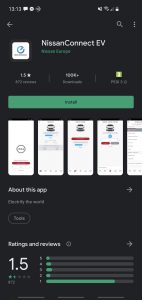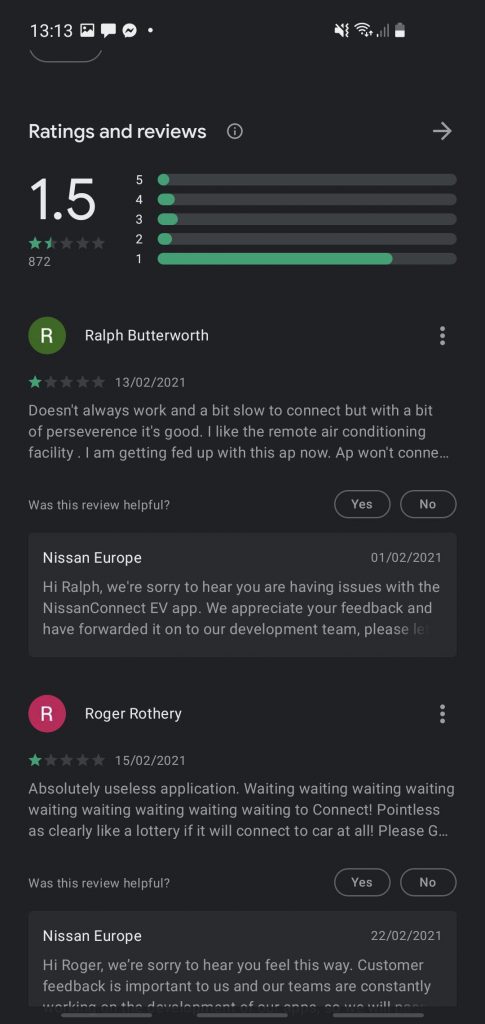Many products live or die by online reviews nowadays. The same can be said of many apps. Carmakers are now releasing their own apps to help drivers synchronize better with their cars. Nissan is one such maker, and they have one app in particular (NissanConnect EV for their electric cars) which has unfortunately received a lot of negative attention on the two main app store platforms, Apple’s App Store, and Google Play.
In today’s blog, we are exploring what this app does (or is supposed to do), what the reviews are saying about what it does (or doesn’t do), as well as what users can do to resolve some of these issues, if at all possible. Hopefully it will offer some clarity to the many frustrated Nissan drivers out there who have been driven to despair with the app.
What Does the NissanConnect EV App Do?

The NissanConnect EV app is currently used exclusively with the Nissan Leaf, but presumably it will also be available – or something similar – on the upcoming Nissan Ariya SUV, too.
It’s available on both smartphone and for smart watches, and offers users the following features:
- The ability to check on your car’s current charge level
- Remote activation of the car’s climate control features
- To start the charging process of your Nissan
- Gives an estimated time as to when charging will be completed
- Gives an estimated driving range based on current charge
Some of these things seem simple, but they do add a great deal of convenience to drivers. It allows them to quickly get the information they need to then make informed decisions on charging, how far they can currently go, when the best times to charge would be, and the current environment in the car so they can make it the optimum temperature before getting into drive away. It’s nifty. The problem is, according to many users, that it doesn’t deliver on its promises.
What are Users Saying About the NissanConnect EV App?
On Google Play, the app has a 1.5-star rating at the time of writing. The vast majority of ratings are 1 star, and the reviews are very revealing:

The Apple App Store rating is even worse at 1.4 stars after 501 ratings. Here’s what some users are saying:
I am getting fed up with this [app] now. [It] won’t connect.
1-star review from February 13, 2021 (Google Play)
Absolutely useless application. Waiting waiting waiting waiting waiting waiting waiting waiting waiting to connect!
1-star review from February 16, 2021 (Google Play)
Awful – Had my Nissan Leaf for over 2 years now and in that time, the app has got slowly worse.
1-star review from February 6, 2019 (App Store)
Users tended to be a lot more comprehensive, and unafraid of being frank and telling the developer what they really think, but we can’t just fill today’s blog with negative reviews. That wouldn’t be productive. So, the main issues that users are having with the app regard connectivity, the general speed of the app, an inability to receive and install updates, and also a poor response from Nissan’s technical support team in resolving issues. The website insideevs.com summed up the issues with the app with a very simple headline back in October 2019 – “The Nissan LEAF Has an Issue With its App: It Does Not Work.”
Common NissanConnect EV App Problems and Fixes
In this next section, we explore some methods of fixing the common complaints that people have about the app. These we have mentioned in the previous section. So, what can be done to make Nissan’s app work better for you?
Solution 1: Restarting Your Device
Amazingly, we are starting with probably the oldest trick in the book: turning your device off and then turning it back on again. This is an instruction that has already been shared to many users by Nissan’s support network. According to users, its effect has been extremely limited. The problem is with the Nissan software itself and not your smart device. Therefore, restarting that device is of no use.
Solution 2: Installing a Wi-Fi Module
One user in Canada reported to insideevs.com that a simple solution that seemed to help with connectivity problems was installing a Wi-Fi module within their Nissan Leaf. The app would then communicate directly with the car and work more efficiently. According to that user, that did work to improve the experience, but it’s not revealed exactly how much it helped.
Solution 3: Update the App
Have you checked to make sure you that you are using the very latest version of the NissanConnect EV app? Nissan claims to have already released periodic updates that have improved the functionality of the app, especially the connectivity. If you have been putting off that app update on your phone, then make sure you do that. After updating, try the app again to see if it works better.
Solution 3A: Fixing Crashes After Updating (iOS only)
One user on the App Store mentioned in July 2020 that they were experiencing an increase in app crashes after they updated the software. If you have experienced something similar, then crashing can be fixed by:
- First closing down all apps and then visiting Settings > General > iPhone Storage
- Click on NissanConnect EV and then hit “Offload App” before powering off your phone
- Restart your phone after 10 seconds, go back to iPhone Storage and this time delete the app.
- Restart the phone one more time in the same way
- Download the app again, sign in again and it should work better
Solution 4 – Be Patient
There are also many users who have reported their suspicions that many of those complaining about the app are just not being patient enough. They point out that because of the way it works, it is bound to take up to 30 seconds to complete some requests. In the modern age, waiting up to 30 seconds can feel like waiting a lifetime, prompting many to rage-quit or cancel the process before it has a chance to work.
If this sounds like you, perhaps let the app work and see if it does get to its final digital destination before you decide that it hasn’t worked. Over time, these issues are likely to be improved as connectivity gets better.
Solution 5 – Use a Third-Party App
There are already some third-party solutions out there that have been inspired by the huge demand created by what is perceived as Nissan’s own failure to make an app that works. The most notable is My Leaf, which is an app we also talk about separately in another blog piece. Below is a brief introduction.
My Leaf is an open-source alternative, free to download (but offers in-app purchases), and works for both the Nissan Leaf and the Nissan e-NV200. It offers all the same features as the official NissanConnect EV app, but with some additional info like detailed trip history.
Such apps as My Leaf will deliver on your needs for connectivity and, according to its positive 4.6-star rating on Google Play, a better experience.
NissanConnect EV App Problems – What’s the Best Solution
The way we see it, changing the app altogether and using the third-party app is arguably the best solution to this problem. It seems that many of the issues that Nissan’s official app is having are rooted in the fundamental parts of the system, and there’s no quick fix for that type of problem.
The beauty of the current smartphone and smart device-based technology is that almost every time, there is a window of opportunity for an open-source or third-party solution that will work better than something made by the “official” channel.
Apps like My Leaf and NissanConnect EV are supposed to make your driving experience better. When they work as they are supposed to, especially in extreme weather, they make our lives that much easier and more bearable. This is the kind of technology people wished they had back in the early 2000s.
Remember to report any issues you are experiencing with NissanConnect to Nissan. Without your feedback, there’s little or nothing they can do to improve the app. Here’s hoping they offer a better solution in the coming months.
7 comments
Overnight my Nissan Connect App has stopped working, or at least won’t let me log on. Normally when I open the app it just opens. Occasionally, as now it asks me to log on. When I try to do that on my iPhone I find that my log on details haven’t been remembered. I refer to my passwords using my fingerprint recognition, find mynissan and click to get log on details. They automatically install on the app but nothing happens. Tried the ‘forgot my password’ trick and received an email. Selected strong password but again wouldn’t allow me to go any further.
I’ve tried switching off my phone several times but just the same. The odd thing is that the same app on my iPad loads up without issue. I can’t be carrying that about wherever I go and it won’t work without WiFi anyway.
Any ideas?
Ugh, yes that all sounds familiar – unfortunately! It’s really annoying. Are you able to login to “MyNissan Account Login” on a normal browser – i.e. via: mynissan.nissanusa.com?
If it works there, then it’s an app issue and it might be worth uninstalling it and re-installing the app.
If you can’t login via a browser/computer either, it’s probably an account issue and it’s worth contacting Nissan customer services.
Sorry I can’t be more help, and I hope you get this fixed soon!
I have been trying to get the apps widgets to work now since July 28 and find that the Nissan techs are just about as smart a rock.
Did you manage to find out how to do it ?
I honestly can’t figure it out aha
I just chatted with support:
“Due to the discontinuation of AT&T’s 2G and 3G cellular networks, your EV Services are no longer working in this vehicle. However, you can continue to access your features like Bluetooth Hands Free Phone system etc.”
Wow… that’s pretty frustrating! Thanks for the info though. I know that the 2G/3G switch-off has been causing issues to a range of products, but you’d think that an EV would have more future-proofing to be honest 🙁
I have a UK ’21 LEAF n-connecta, the app continually logs me out and I have to re-enter my user name and password (laboriously) every time it does it.
The app will only allow one user (so my wife has to use the same account, with the same results).
Apart from the poor and very limited features, the app occasionally sends random notifications (‘your car is being towed’… – which are entirely spurious). But really useful information like the alarm has been triggered doesn’t merit any notification.
I haven’t had any updates for the app in the year I have owned the vehicle (and I’ve checked/reinstalled to try).